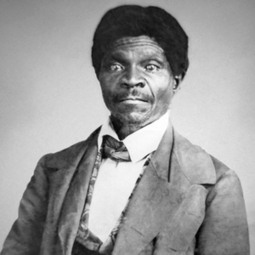AMY GOODMAN: Just miles down the road from the scene of protests in Ferguson, we’re hearing a lot about Florissant. Just down Florissant is the grave of Dred Scott, who’s buried in the Calvary Cemetery on West Florissant Avenue. Born a slave in Virginia, Dred Scott sued in a St. Louis court for his freedom. The case went to the Supreme Court, resulting in a landmark Supreme Court decision that’s called the worst ever. In 1857, the court ruled African Americans were not citizens of the United States, and therefore had no rights to sue in federal courts. The court described blacks as, quote, “beings of an inferior order, and altogether unfit to associate with the white race, either in social or political relations, and so far inferior that they had no rights which the white man was bound to respect,” unquote. Again, the Dred Scott decision, considered the worst decision in the history of the Supreme Court, in the slave state of Missouri, the seven-to-two decision. The chief justice was a slave owner himself. In fact, a number of the Supreme Court justices were slave owners themselves.
To talk more about the significance of this case today, we’re joined by Kimberlé Crenshaw, professor of law at UCLA and Columbia University, founder of the African American Policy Forum.
Kimberlé, thank you for joining us. Professor Crenshaw, talk about the significance of Dred Scott’s body just lying down the road on Florissant, the road we’ve heard so much about, as these protests continue and escalate.
KIMBERLÉ CRENSHAW: Well, really couldn’t be more symbolic. As you point out, Dred Scott is widely regarded as being one of the worst cases ever. And there are two ways in which we might see its relevance in this particular moment. One, when the Supreme Court was trying to decide whether African Americans could be citizens, what they considered was the way African Americans were treated. They weren’t necessarily looking at formal law. In a lot of ways, free blacks had more rights than white women did. But the overall idea was that they could be enslavable. The overall idea is that they weren’t seen as having the same social worth as white Americans and could be enslaved for their own good. So the very possibility of their enslavability meant that, at least as far as the founders were concerned, they were going to be forever and permanently a stateless people. And that would have likely been the case had the case not led to a civil war.
Source: www.democracynow.org


